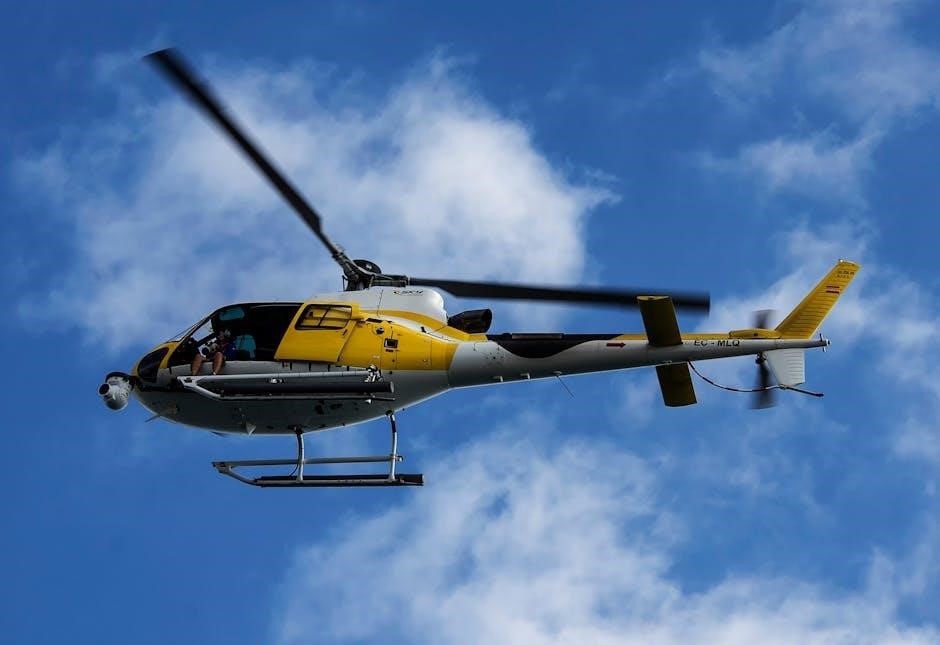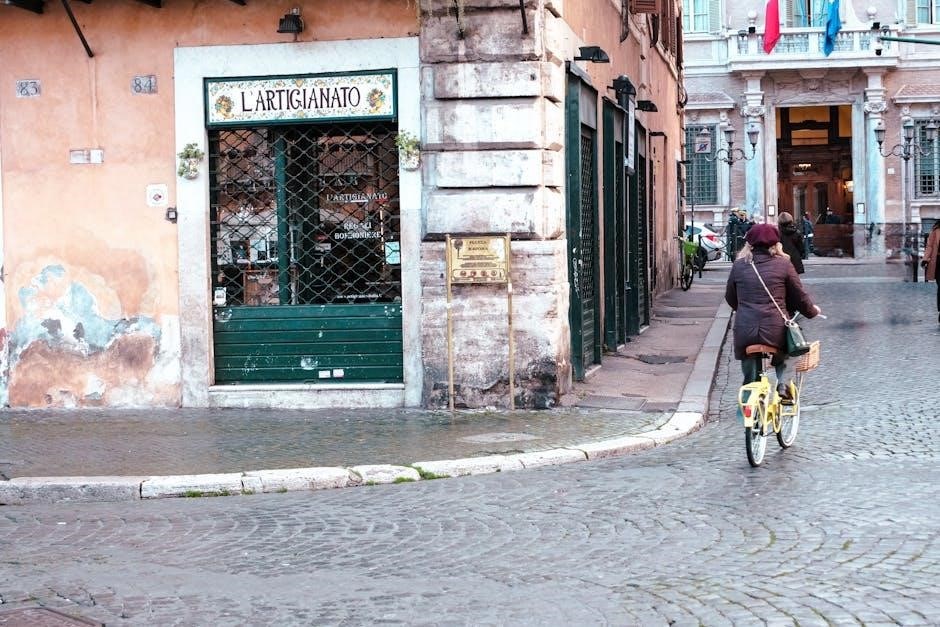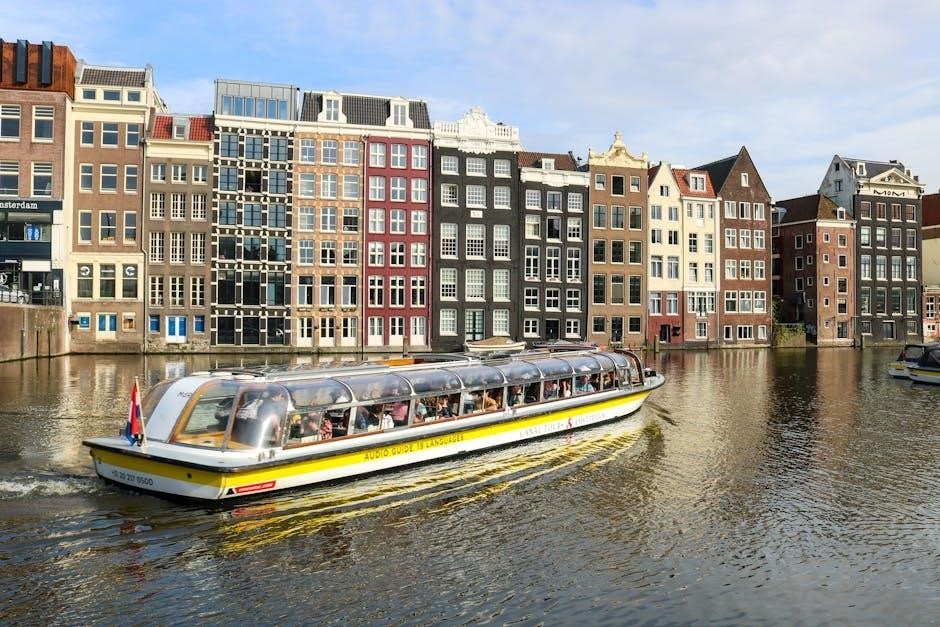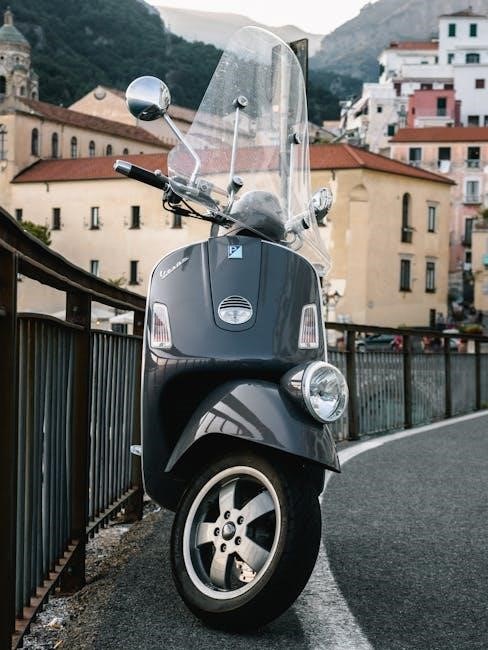Tipping European tour guides varies across cultures‚ with some countries expecting tips while others include service charges. This guide helps travelers understand regional customs and show appreciation appropriately.
1.1 Why Tipping is Important in European Tourism
Tipping European tour guides is a significant aspect of showing appreciation for their services. In many European countries‚ tips are not automatically included in the bill‚ making them a crucial part of a tour guide’s income. A good tip reflects satisfaction with the guide’s knowledge‚ effort‚ and overall tour experience. It also encourages guides to maintain high service standards. Additionally‚ tipping is a cultural gesture of gratitude‚ helping travelers connect with local customs. While not always mandatory‚ tipping demonstrates respect for the guide’s expertise and enhances the positive interaction between tourists and locals. This practice fosters a positive tourism environment‚ ensuring memorable experiences for visitors while supporting the livelihood of those in the service industry.

How Much to Tip European Tour Guides
Tipping European tour guides typically ranges from 5-15% of the tour cost‚ depending on the guide’s performance and the tour’s duration. This ensures fair compensation for their expertise and effort.
2.1 General Percentage Guidelines for Tipping
When determining how much to tip European tour guides‚ a general rule of thumb is to aim for 5-15% of the total tour cost. For guided tours lasting several hours‚ 10% is typically expected for satisfactory service. If the tour is exceptional‚ consider increasing the tip to 15%. For multi-day tours‚ tipping can be adjusted daily‚ with €10-15 per person per day for tour managers and €5-10 for bus drivers. Local guides usually receive €5-10 for half-day tours and €10-15 for full-day excursions. These percentages serve as a baseline‚ but adjustments can be made based on the guide’s performance and the overall experience. Always avoid exceeding 15%‚ as this may lead to over-tipping. Remember‚ tipping is a gesture of gratitude and should reflect the quality of service received. Combining tips with fellow travelers can also simplify the process for everyone involved.
2.2 Factors Influencing the Amount to Tip
The amount to tip European tour guides can vary based on several factors. First‚ the quality of the tour and the guide’s performance play a significant role. If the guide is knowledgeable‚ engaging‚ and goes above and beyond‚ a higher tip is warranted. Second‚ the length and type of the tour influence the amount—longer or more specialized tours typically deserve larger tips; Additionally‚ the cost of the tour itself is a key factor; higher-priced tours may lead to higher tips. The guide’s professionalism‚ such as punctuality and responsiveness to questions‚ also impacts the amount. Regional tipping customs‚ as service charges may already be included in some countries‚ should also be considered. Finally‚ group size matters‚ as larger groups may split the tip‚ reducing the individual contribution. These factors help determine a fair and appropriate tip for the service received‚ ensuring it reflects the overall experience and satisfaction with the tour guide. Personal discretion and regional norms are essential in making this decision.

When to Tip European Tour Guides
Tipping European tour guides is typically done after the tour concludes‚ as a gesture of appreciation for their service. For multi-day tours‚ tips can be given at the end or divided across days.
3.1 After the Tour Ends
Tipping European tour guides after the tour concludes is a common practice to express gratitude for their services. The amount varies depending on the tour’s duration and quality. For short walking tours‚ 1-2 euros per person is standard‚ while longer or more detailed tours may warrant 3-5 euros. If the tour was exceptional‚ consider tipping slightly more. In group tours‚ pooling tips among participants is customary‚ ensuring the guide receives a fair total. For private tours‚ tipping amounts can be higher‚ reflecting the personalized service received. Always use cash‚ as card tipping is less common. Remember‚ tipping is optional but appreciated for outstanding service. If a tip is already included in the tour price‚ check beforehand to avoid double-tipping. This approach ensures your gratitude is conveyed thoughtfully and appropriately.
3.2 During Multi-Day Tours
For multi-day tours‚ tipping European tour guides is typically handled at the end of the trip. A common recommendation is to tip €6.50 per person per day for the guide‚ with a similar amount for the bus driver if applicable. This ensures fair compensation for their extended service. In group tours‚ participants often pool their contributions to present a collective tip‚ making the process easier and more equitable. For private multi-day tours‚ tipping amounts can be adjusted based on the level of personalized service received. Always use cash‚ as it’s the preferred method. If tipping is already included in the tour package‚ check the terms to avoid double-tipping. This approach ensures a smooth and appreciated conclusion to your multi-day tour experience.
3.3 Special Cases for Extraordinary Service
When tour guides go above and beyond‚ such as providing exceptional insights‚ handling unexpected challenges‚ or adding personalized touches‚ consider tipping more generously. For extraordinary service‚ tipping 10% of the tour’s total cost is a thoughtful gesture. If the guide has made your experience truly memorable‚ some travelers opt to tip €10-€20 per person for a full-day tour. This reflects their appreciation for the guide’s effort and dedication. Additionally‚ combining a cash tip with heartfelt verbal gratitude can make the gesture even more meaningful. For multi-day tours‚ tipping an extra €5-€10 per day for exceptional service is also common. Such gestures acknowledge the guide’s hard work and ensure they feel valued for exceeding expectations. Remember‚ tipping for extraordinary service is optional but deeply appreciated and reflects the quality of care received during the tour.

Country-Specific Tipping Customs in Europe
European countries have varying tipping customs‚ with some expecting higher gratuities and others including service charges. Knowing these norms helps travelers show appreciation appropriately and respectfully during their journeys.
4.1 Tipping Norms in Western European Countries
In Western Europe‚ tipping practices differ by country. In France‚ 5-10% is standard‚ while in Germany‚ rounding up the bill is customary. In the UK‚ 10-15% is typical for good service. Belgium‚ Netherlands‚ and Switzerland also follow similar patterns‚ with tips ranging from 5-10%. In Spain and Italy‚ tipping is less expected but appreciated‚ typically around 5%. For tour guides‚ €1-2 per person per tour is common. These amounts show gratitude without being excessive‚ reflecting the region’s balanced approach to tipping. Knowing these norms ensures travelers can express appreciation appropriately while respecting local customs. Tipping is not mandatory but is a kind gesture for exceptional service. This ensures a harmonious cultural exchange during travels across Western Europe. These practices are well-established‚ making it easier for visitors to navigate tipping expectations. Tipping in Western Europe is a considerate way to acknowledge great service.

4.2 Tipping Norms in Southern European Countries
In Southern Europe‚ tipping customs vary slightly by country but generally remain modest. In Greece‚ tipping 5-10% in restaurants and bars is common‚ while in Turkey‚ rounding up the bill or leaving small change is appreciated. Italy and Spain follow similar patterns‚ with tips ranging from 5-10% for meals and drinks. Portugal also aligns with these practices‚ though tipping is not always expected but is considered polite. For tour guides‚ €1-2 per person per tour is typical‚ reflecting the region’s moderate tipping expectations. Tipping in Southern Europe is less formal compared to Northern Europe‚ but it is still a thoughtful way to acknowledge good service. These customs ensure visitors can express gratitude without overcomplicating the process. Overall‚ tipping in Southern Europe is straightforward and aligns with the region’s laid-back culture‚ making it easy for travelers to navigate. These practices are deeply rooted in local traditions and are widely accepted. Tipping here is a gesture of appreciation‚ not an obligation.
4.3 Tipping Norms in Eastern European Countries
Tipping customs in Eastern Europe vary but are generally modest. In Poland‚ the Czech Republic‚ and Hungary‚ tipping 5-10% in restaurants and bars is standard‚ while in Romania and Bulgaria‚ rounding up the bill or leaving 5-10% is customary. For tour guides‚ tipping €1-2 per person for a half-day tour is appreciated‚ though it’s optional; In Ukraine and Russia‚ tipping is less common but still welcomed‚ especially for exceptional service. Local guides often receive similar amounts to their Western counterparts‚ reflecting the growing influence of tourism. Tipping in Eastern Europe is not always expected but is considered polite‚ especially in larger cities. These practices align with the region’s evolving service industry norms‚ allowing visitors to show gratitude without pressure. Tipping here is a gesture of appreciation‚ not a strict requirement‚ making it easier for travelers to navigate cultural differences. Overall‚ tipping in Eastern Europe remains a thoughtful way to acknowledge good service. These customs are shaped by local traditions and economic conditions.

Who Else to Tip Besides the Tour Guide

Besides tour guides‚ consider tipping hotel staff‚ concierge‚ bus drivers‚ and local experts. These individuals enhance your travel experience‚ and small gratuities are appreciated for exceptional service.
5.1 Tipping the Bus Driver
Tipping bus drivers in Europe is a thoughtful gesture to acknowledge their role in ensuring a smooth and safe journey. For day trips or shorter excursions‚ tipping €1 to €2 per person is considered appropriate. On multi-day tours‚ a daily tip of €5 to €10 per person is common‚ depending on the length of the trip and the driver’s assistance with luggage or additional services. Some tour groups prefer to collect tips for the driver through the tour guide to simplify the process. If the driver has gone above and beyond‚ such as helping with bags or providing extra support‚ increasing the tip is a kind way to show gratitude. Remember‚ tipping is optional but greatly appreciated for exceptional service.
5.2 Tipping Local Experts or Specialists
Tipping local experts or specialists‚ such as historians‚ chefs‚ or artisans who contribute to your tour‚ is a thoughtful way to acknowledge their specialized knowledge. For short sessions or workshops‚ tipping €2 to €5 per person is common. If the expert provides an in-depth experience or goes above and beyond‚ consider tipping €10 or more per person. Group tipping is often practical‚ where participants pool their contributions to present a collective amount. This ensures fairness and avoids awkward moments. When tipping‚ hand the money directly or place it in an envelope if it’s a group setting. While tipping is optional‚ it’s a meaningful gesture to show appreciation for their expertise and effort. Remember‚ these individuals often rely on tips to supplement their income‚ making your generosity impactful.
5.3 Tipping Hotel Staff and Concierge
Tipping hotel staff and concierge in Europe is not always mandatory but is appreciated for excellent service; For porters‚ €1-2 per bag is customary when they assist with luggage. Housekeeping staff typically receives €1-2 per night‚ left in an envelope or placed in the room. Concierge services‚ such as booking restaurants or arranging tours‚ warrant a tip of €5-10‚ depending on the complexity of the request. In some European countries‚ service charges are already included in hotel bills‚ so check before tipping additionally. Tipping hotel staff is a kind gesture to acknowledge their hard work and ensure a positive experience. Europeans often tip less than Americans‚ so modest amounts are sufficient. Always hand tips directly to the staff member to ensure they receive your gratitude. This practice helps maintain high service standards and shows appreciation for their efforts.
How to Tip Politely and Appropriately

Tipping in Europe should be discreet and respectful. Hand tips directly to staff or place them in visible areas. Smile and express gratitude verbally or with a note for exceptional service.
6.1 Cash vs. Card: Preferred Payment Methods

Cash remains the preferred method for tipping tour guides in Europe‚ ensuring direct and immediate appreciation. Many guides rely on cash tips‚ as card payments often go to companies. Carrying local currency is advisable‚ especially for smaller amounts. However‚ some modern tour operators now accept card payments‚ making it convenient for travelers. When using a card‚ check if the tip goes directly to the guide. For multi-day tours‚ combining cash and card tips can be practical. Always confirm payment methods with your guide to ensure smooth transactions. Cash is still king in tipping culture‚ but card options are growing. saldo between both ensures flexibility and convenience for travelers.
6.2 Verbal Appreciation as a Form of Gratitude

Expressing genuine verbal appreciation is a meaningful way to show gratitude toward European tour guides. While monetary tips are customary‚ complementing their efforts with kind words enhances their experience. A sincere “thank you” or acknowledging their expertise can make a significant difference. For instance‚ mentioning how their insights enriched your understanding of the destination or praising their organizational skills can boost morale. Verbal gratitude is particularly valued in cultures where tipping is not always expected but is appreciated. It also provides an opportunity to connect personally‚ fostering a positive interaction. Whether delivered individually or as a group‚ heartfelt words of appreciation are universally understood and valued. This approach not only complements monetary tips but also leaves a lasting impression of respect and acknowledgment for their hard work.
